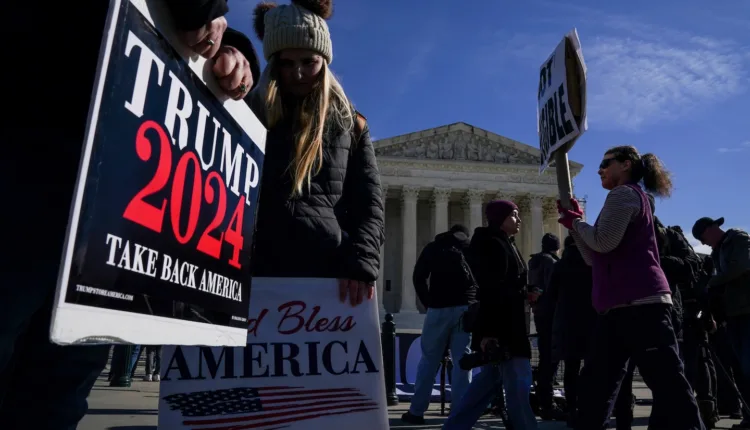
Supreme Court Term Gains Impact with Trump Immunity Case
TL/DR –
The US Supreme Court is facing a significant number of high-profile cases in the coming months, including a case regarding Donald Trump’s claimed immunity from criminal prosecution. The court’s decision to hear this case has drawn criticism, as it could potentially delay Trump’s D.C. election obstruction trial until after the 2024 election. Other critical cases on the court’s docket involve issues like free speech online, the power of federal agencies, and access to abortion medication.
Supreme Court in High-Stakes Session as Key Cases Loom
In the upcoming four months, the Supreme Court will decide on a significant amount of consequential cases, shaping some of America’s most significant issues and influencing the upcoming presidential election.
The most anticipated decision is whether Donald Trump is immune from criminal prosecution for attempting to overturn the 2020 election results. This decision follows criticism for seemingly aiding Trump’s efforts to delay his D.C. election obstruction trial until after the 2024 election.
The Justices are also considering influential cases affecting online free speech, federal agency power, and access to popular abortion medication. They also will decide two other significant cases related to Trump.
Despite this large caseload, the court has only announced five decisions, leaving 92 percent of the argued cases unresolved before the term ends in June or July.
Law professor Steve Vladeck who monitors the Justices’ work, stated that the court is at a tipping point due to recent landmark decisions, a major presidential candidate’s potential criminal prosecution, a surge of emergency applications, and congressional deadlock on key issues.
Analysts say the backlog is partly self-inflicted, with resurfaced issues like abortion and gun rights coupled with the effort to release the high court’s first code of conduct. The court is also flooded with emergency requests, making them central to nearly every major political issue.
The same week the court reviews Trump’s immunity claim, they will also examine a challenge to Idaho’s abortion law, a case added to the calendar before an appeals court had ruled.
Additionally, the court is behind in issuing opinions. South Carolina is still awaiting a decision to reinstate a congressional map drawn by the GOP-majority legislature. The court has yet to announce a decision in a Second Amendment case from November as well.
Adam Feldman, founder of Empirical SCOTUS, notes that the current backlog is the slowest pace during Chief Justice John G. Roberts Jr’s tenure. As of March 1 of the 2005 term, the court had issued rulings in more than a third of its argued cases. This year, it is at 8 percent.
The court has also agreed to review the validity of a law used to charge hundreds of people in connection with the Jan. 6 riot. This case is scheduled the week before the court takes up Trump’s immunity claim.
In January, the justices agreed to decide whether states can disqualify Trump from the ballot due to his actions surrounding the Jan. 6, 2021 attack on the U.S. Capitol.
Given the practical realities of the political calendar, the justices “seem kind of indifferent to what the effects of this are on whether there can be a trial at all,” said Pamela S. Karlan, a Stanford University law professor.
The decision to set the case for the last full week of April suggests a compromise even as it pushes a possible date for Trump’s D.C. trial into late summer or early fall.
Jonathan Adler, a professor at Case Western Reserve University School of Law, said in a column Thursday that there is no question the case is worthy of review by the high court.
Adler wrote, “This leaves us with the unhappy choice of letting the Supreme Court further define the contours of presidential immunity on the eve of a presidential election in which the defendant is a candidate. That is not a great place to be, but that’s where we are.”
—
Read More US News
